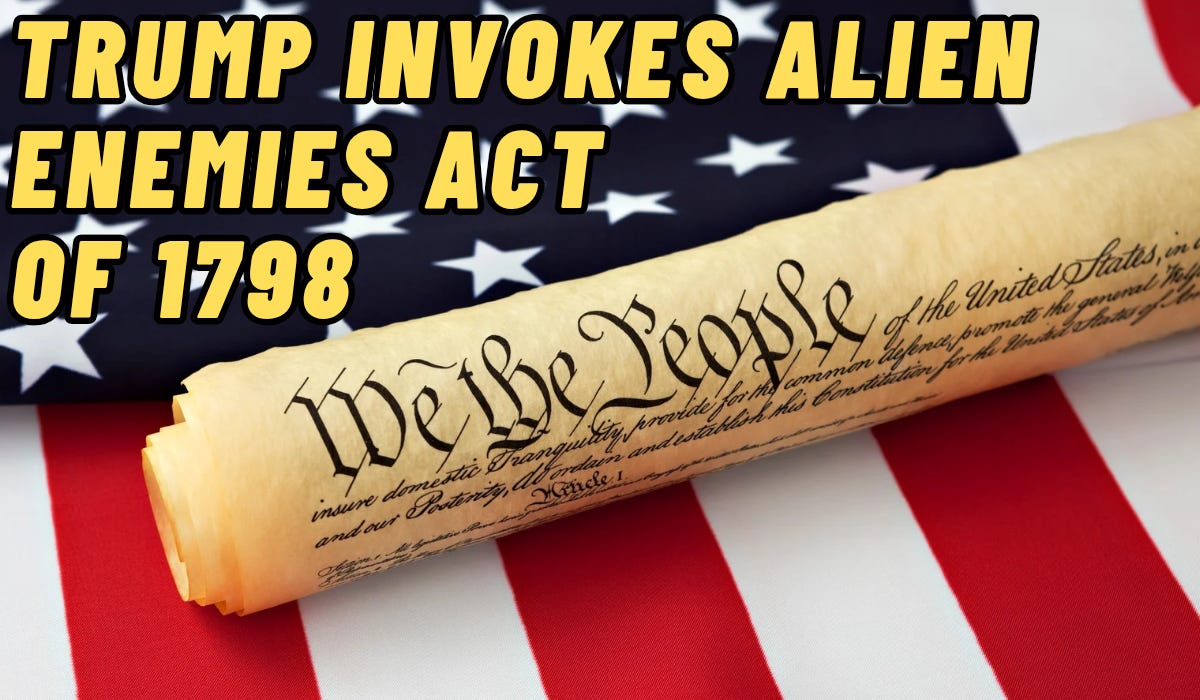Reviving 18th-Century Laws to Justify 21st-Century Deportations:
Trump's Dubious Use of the Alien Enemies Act
TRUMP INVOKES ALIEN ENEMIES ACT OF 1798
In a move that raises eyebrows and resurrects a centuries-old relic of American law, yes, he really just did it, President Donald Trump has decided to invoke the Alien Enemies Act of 1798—because, apparently, nothing says "modern immigration policy" like dusting off a law written before the invention of the steam locomotive. His target? Alleged members of the Venezuelan gang Tren De Aragua, whom he accuses of "unlawfully infiltrating" the United States.
The order, which purports to grant the president sweeping wartime powers despite the conspicuous absence of an actual war, was met with immediate legal resistance. Within hours of its announcement, the American Civil Liberties Union 1 and Democracy Forward 2 filed a lawsuit challenging the administration’s attempt to deport five Venezuelan men under this obscure and, some argue, outdated law. The legal pushback led Chief Judge James E. Boasberg of the D.C. District Court to intervene, initially blocking the deportations and later expanding his ruling to prevent the administration from expelling any non-citizens in U.S. custody under this proclamation—for now.
PRESS RELEASES FROM LAW SUITS FILED: (UPDATED AT 9:47PM ON 03/15/2025)
"Over the years, Venezuelan national and local authorities have ceded ever greater control over their territories to transnational criminal organizations, including TdA [Tren De Aragua). The result is a hybrid criminal state that is perpetrating an invasion of and predatory incursion into the United States, and which poses a substantial danger to the United States."
Trump's proclamation reads.
Trump’s justification for this extraordinary measure is that Venezuela’s government, particularly its law enforcement and military, has been infiltrated by Tren De Aragua, which he claims is conducting "irregular warfare" against the United States. The proclamation also paints the group as a key player in the drug trade, supposedly weaponizing narcotics against American citizens. In other words, this is a national emergency—or at least, an election-year emergency that just so happens to align with Trump's longstanding promises to wield unprecedented executive power against migrants.
Despite the judge’s clear ruling, questions remain about whether the administration is truly complying. Government lawyers insisted in court that the five Venezuelans named in the lawsuit were not aboard any deportation flights, but were noticeably less certain about whether other flights, presumably carrying additional Venezuelans, were already en route to Central America.
"Today was a horrific day in the history of the nation, when the President publicized that he was seeking to invoke extraordinary wartime powers in the absence of a war or invasion and claiming virtually unlimited authority to remove people from the country, but tonight the rule of law prevailed."
-Skye Perryman, the president of Democracy Forward said in a statement.
And what of the fate awaiting those who are deported? Boasberg himself seemed less than reassured, bluntly noting that individuals being sent to Honduran and Salvadoran prisons likely wouldn't be met with a warm reception. If this was meant to deter the administration, it’s unclear whether they got the message.
The judge, perhaps aware of the administration’s fondness for bending legal boundaries, issued a pointed warning:
"This is something you need to make sure is complied with immediately."
Critics, including legal scholars, have been swift to highlight the absurdity of Trump’s interpretation of the Alien Enemies Act. Originally designed for use in times of war—actual war, not rhetorical flourishes about gang violence—the law has not been invoked in nearly a century. The last time it was used, President Franklin D. Roosevelt targeted Japanese, German, and Italian immigrants during World War II—actions the U.S. government has since formally apologized for. Yet here we are, in 2025, watching history repeat itself in real time.
Even within Congress, some lawmakers have been working for years to repeal this archaic statute, recognizing its potential for abuse. Representative Ilhan Omar and Senator Mazie Hirono have repeatedly pushed legislation to scrap the law entirely, citing its outdated nature and its capacity to enable executive overreach. But, in a remarkable display of selective nostalgia, Trump has revived it as a cornerstone of his immigration policy.
So, as deportation flights remain grounded (for now) and legal battles rage on, one question looms: Is this about national security, or is it about setting a precedent—one that allows a president to bypass democratic norms, dust off antiquated laws, and reshape immigration policy with the stroke of a pen? If history is any guide, this experiment in unchecked executive power may not end well—for the Constitution, for immigrants, or for those who still believe in due process.












